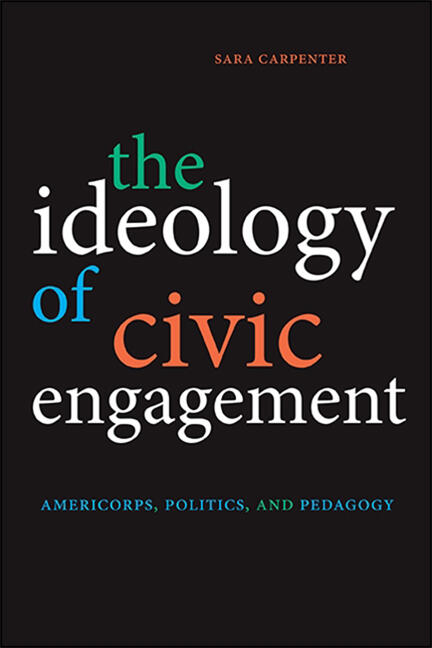
An interesting book of research on AmeriCorps that challenges us deeply to think about the mission and the structures that we operate in that often are intended to make us ineffective.
Sara Carpenter Thesis Abstract
Over the last twenty years, the academic work on citizenship education and democracy promotion has grown exponentially. This research investigates the United States federal government‘s cultivation of a politics of citizenship‘ through the Corporation for National and Community Service and the AmeriCorps program. Drawing on Marxist-feminist theory and institutional ethnography, this research examines the ways in which democratic learning is organized within the AmeriCorps program through the category of civic engagement‘ and under the auspices of federal regulations that coordinate the practice of AmeriCorps programs translocally.
The findings from this research demonstrate that the federal regulations of the AmeriCorps program mandate a practice and create an environment in which politics,‘ understood broadly as having both partisan and non-partisan dimensions, are actively avoided in formalized learning activities within the program. The effect of these regulations is to create an ideological environment in which learning is separated from experience and social problems are disconnected from the political and material relations in which they are constituted.
Further, the AmeriCorps program cultivates an institutional discourse in which good citizenship is equated with participation at the local scale, which pivots on a notion of community service that is actively disengaged from the State. Through its reliance on these forms of democratic consciousness, the AmeriCorps program engages in reproductive praxis, ultimately reproducing already existing inequalities within U.S. society.
The primary elements of this reproductive praxis have been identified as a local fetish‘ and the democratic management of inequality.‘
The local fetish refers to the solidification of the local as the preferential terrain of democratic engagement and is characterized by an emphasis on face-to-face moral relationships, local community building, and small-scale politics.
The democratic management of inequality refers to the development of discursive practices and the organization of volunteer labor in the service of poverty amelioration, which is in turn labeled good citizenship.‘ This research directs our attention to a more complicated notion of praxis and its relationship to the reproduction of social relations. Also, this research brings into focus the problem of the conceptualization of civil society and its relationship to democracy and capitalism
__________________________________________________________________________________
/voters-voting-in-polling-place-138711480-87a09f220a71438dbdff698a643c8cf1.jpg)
Final Comments from the Dissertation
As I brainstormed elements to include in the conclusion to this thesis, a friend asked me what I hoped my research participants would get from reading this text. In that moment, I had to confront the reality that I have not necessarily written this thesis for them. I have written for myself and for those like me who are struggling with their own understanding of themselves in relation to questions of social justice and transformation; for those who have similarly grown tired of the limits of the progressive imagination and the lack of curiosity they confront in social activism.
That may sound deeply cynical and dismissive, but it was precisely how I felt when I left the United States to pursue this doctoral degree. I felt as though everyone around me was utterly satisfied with the uncomplicated understandings of social life that circulated through leftist‘ politics and that they genuinely wanted a little bit of social change to be enough social
change. If being unsatisfied with these limitations is being cynical, then that is fine with me. I hope that students who are interested in political consciousness will take from this work that solutions might also be problems and that doing good‘ is harder than it seems. Also, I hope my readers glean not just the importance of critique, but the importance of critical reflection understood as a dialectical relation between going forward and looking back. Perhaps I will concede that Dewey might have been right on that point.
Because of this, I hope that my research participants will think critically about the many paradoxical elements I have attempted to hold together in this research. Perhaps some will feel that I have not accurately represented their experience because my window into this world was partially obscured by my own position. I suspect others will feel I have said things that needed to be said.
If these research participants go on to do what Obama, Bush, and Clinton have envisioned that they might, that is lead long lives of public service, I hope they will understand that the conditions of their work are not natural or neutral, but political constructions. That everything around them is a contestation of power. That they, who so earnestly hope to do good, are engaged in class struggle, whether they like it or not. I hope that they understand that their year of service was not pointless or worthless; important learning can come from the experience of volunteerism. I am evidence of that fact and I saw many of my research participants grow and deepen in their intellectual and emotional engagement over the course of the six months I spent with them.
I hope that they remember that their discomfort and unease about their own work and their own place in the world is an important thing to hold on to. I remember that one day, in one group, we discussed that if you hurt yourself you feel pain; your body is telling you something is wrong. If you go to serve at the homeless shelter and you feel guilty, your body is telling you that something is wrong. I hope they will take seriously what Lillian Smith (1946), another of my heroes, said about society‘s struggle to transform itself
: “Always the conscience hurt; always 298 there were doubts and scruples; always hate was tempered with a little love, and always folks were inconsistent…ideals seemed to be dead, but at least their ghosts haunted men‟s [sic] souls” (P. 68)